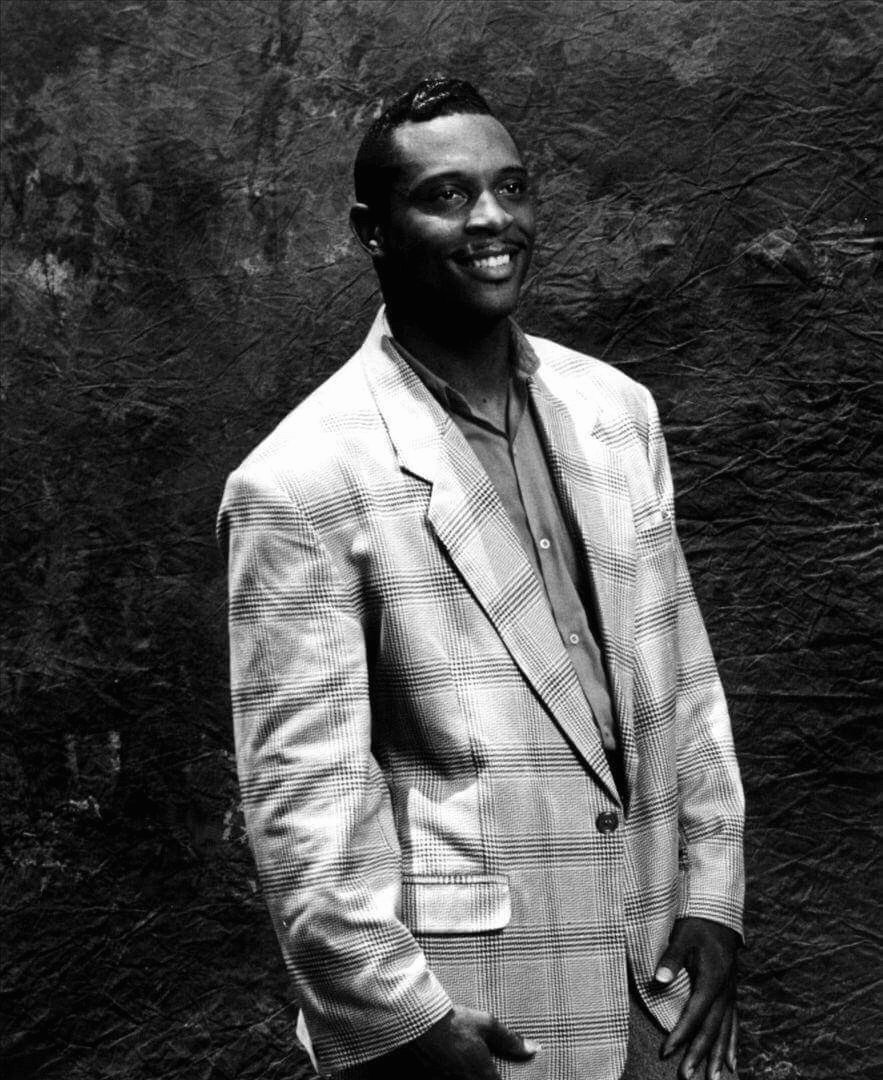
He has been called his generation’s best non-vocal gospel performer and the choir that he led, The Associates, are widely recognized as the best of the 1990s, not to mention one of the top ensembles ever assembled. As a director, arranger, and producer, Draper masterfully blended the past and the present of gospel music, creating something both refreshingly contemporary yet deeply steeped in tradition.


O’Landa Draper was born in 1963 and grew up in Alabama and Washington D.C., where he immersed himself in the music of the church. His mother, Marie Draper, played an important role in her son’s fascination with gospel music, as she worked as both a recording artist and a music promoter. When he was 13, Draper and his family moved to Memphis, where he enrolled at Overton High School, one of the city’s best performing arts schools. Draper soon joined the school’s glee club, where he began to write and sing gospel music and study under the leadership of well-respected choir director Lulah Hedgeman. “I just knew there was something there,” Draper later recalled. “I was so mesmerized by the effect of gospel on me. I would sit in my room and shed tears, feeling the importance of what the words were saying and the life that they could bring.”
After graduating from Overton in 1982, Draper continued his education at Memphis State University, eventually becoming the director of the university’s gospel choir. Upon graduation, a then 22-year-old Draper set about forming his own 12-member group called O’Landa Draper and the Associates. Before long, the size of the choir had ballooned to 60 voices strong and quickly gained a reputation as a versatile and powerful ensemble led by one of the most charismatic leaders in the genre. The group’s first big break came in 1989 when they backed celebrated gospel singer Shirley Ceaser on her popular recording “I Remember Mama.” The following year, Draper and the Associates signed a four-year contract with the Word Records label, making them the first Memphis-based choir to ever sign with a major label. Soon after, they released their debut album Do It Again, which was followed by their Grammy nominated release Above and Beyond.

Within the world of gospel, the young O’Landa Draper was swiftly garnering attention and praise for his dynamism and vigor as a director, as well as the discipline of his group. “His choir was highly choreographed,” said Teresa Harris, publisher of Gospel Today magazine. “But the music never suffered because of it. They sang with such clarity, with excellent pitch.” His influence on other gospel musicians, which would only increase with time, was already being felt as well, as directors across the nation strove to match his demonstrative style. “He’d bring the best out of you without being harsh,” remembered gospel artist Ann McCrary. “A lot of people don’t like working under that kind of perfection, but the end result was a good sounding choir. And he would be so humorous in the way that he would point out what you needed to work on that you wanted to give him your best. That’s just the way he was with others and his own choir.”
As the group’s reputation spread, so did their opportunities. Draper and the Associates began touring across the United States, including performances for presidents Jimmy Carter, George H.W. Bush, and Bill Clinton. Their biggest moment in the spotlight, however, occurred in 1994 when O’Landa Draper and the Associates were included on Billy Joel’s hit single and music video “River of Dreams,” the superstar’s most successful song of the decade. Draper and his choir also joined Billy Joel during his live performance of the song at the 1994 Grammy Awards, giving them the type of wide-spread exposure of which few gospel groups even dream.


Despite his ever-growing popularity, Draper remained remarkably humble, dedicating a generous amount of his time concentrating on educating future generations about the history and culture of the gospel tradition. In 1994, he began hosting his annual Music Lover’s Conference in Memphis, which attracted aspiring songwriters, soloists, choir members, directors, and instrumentalists from throughout the U.S. He hosted similar workshops both around the country and abroad, often featuring other gospel luminaries like Kirk Franklin and Yolanda Adams. Additionally, The O’Landa Draper Ministries began a scholarship program for promising students and worked behind the scenes to assist victims of homelessness, drug addiction, and AIDS.

That same year, Draper released the album Live: A Celebration of Praise, which neared the top of the gospel music charts and produced the beloved song “My Soul Doth Magnify the Lord.” A Celebration of Praise went on to become his second album to earn a coveted Grammy Award nomination. In 1996, Draper recorded his third Grammy nominated live album Gotta Feelin for Warner Music Group, which featured the hit songs “Gotta Feelin” and “Reflections.” The album reached the second spot on the gospel music charts and received both Stellar and Dove awards, two of the industry’s top prizes.
Two years later, Draper released his final album Reflections, the winner of the Grammy Award for Best Gospel Choir or Chorus Album. The album, which spawned the hit “Give It Up,” was yet another prime example of his unparalleled ability to blend the contemporary and traditional sides of gospel music. “’Give It Up’ has more of an urbanized beat for the youth,” explained Draper. “But message-wise, both ‘Give It Up’ and our arrangement of the hymn ‘Yield Not to Temptation’ bring the same message to the table, but for different generations.” As with nearly all of the O’Landa Draper and The Associates albums, Reflections received rave reviews for Draper’s powerful, boisterous voice and the freshness of its sound. The Gospel Music Industry Roundup went on to name Draper as one of the nation’s top 10 choir directors of the year.

Only a few weeks after the release of Reflections, O’Landa Draper died unexpectedly at the age of 34 while preparing to perform in Nashville. His death left a cavernous hole in modern gospel, of which he was one of the genre’s brightest stars. “This is a big loss to the gospel world,” said Ann McCrary at the time. “O’Landa was on the cutting edge of contemporary gospel music. He was a prolific writer and arranger. It will be years from now before people look back on his work and realize what a talent he really was.”
In 2000, the Associates, now lead by Draper’s fiancé Patrina Smith, reunited to record their final album in Memphis All About Him (Jesus). Unsurprisingly, the album served as a heartfelt ode from the choir to their former musical leader, particularly the riveting tribute song “I’ll See You Again.” The album consisted of old favorites performed live and a few new ones, not to mention the 2001 R&B radio hit “All About Him Remix” and the gospel classic “Clean Me Up.” In 2016, Draper was posthumously honored with the Rev. James Cleveland Lifetime Achievement Award by the Stellar Awards, yet another testament to his greatness. Despite his many achievements, O’Landa Draper’s deep and lasting influence can’t and shouldn’t be measured solely by industry awards and honors. Instead, his legacy should reflect the characteristics he most embodied during his brief lifetime: tireless dedication, musical innovation, and an unwavering faith in God.
What Others are Saying
I knew O’Landa from the time we were teenagers. We grew up in the same church. A few moments before he passed away, I took my mother to a restaurant where his choir was performing. It was my mother’s birthday and O’landa dedicated the program to my mother. My mother was so happy. I will always be grateful for that moment.